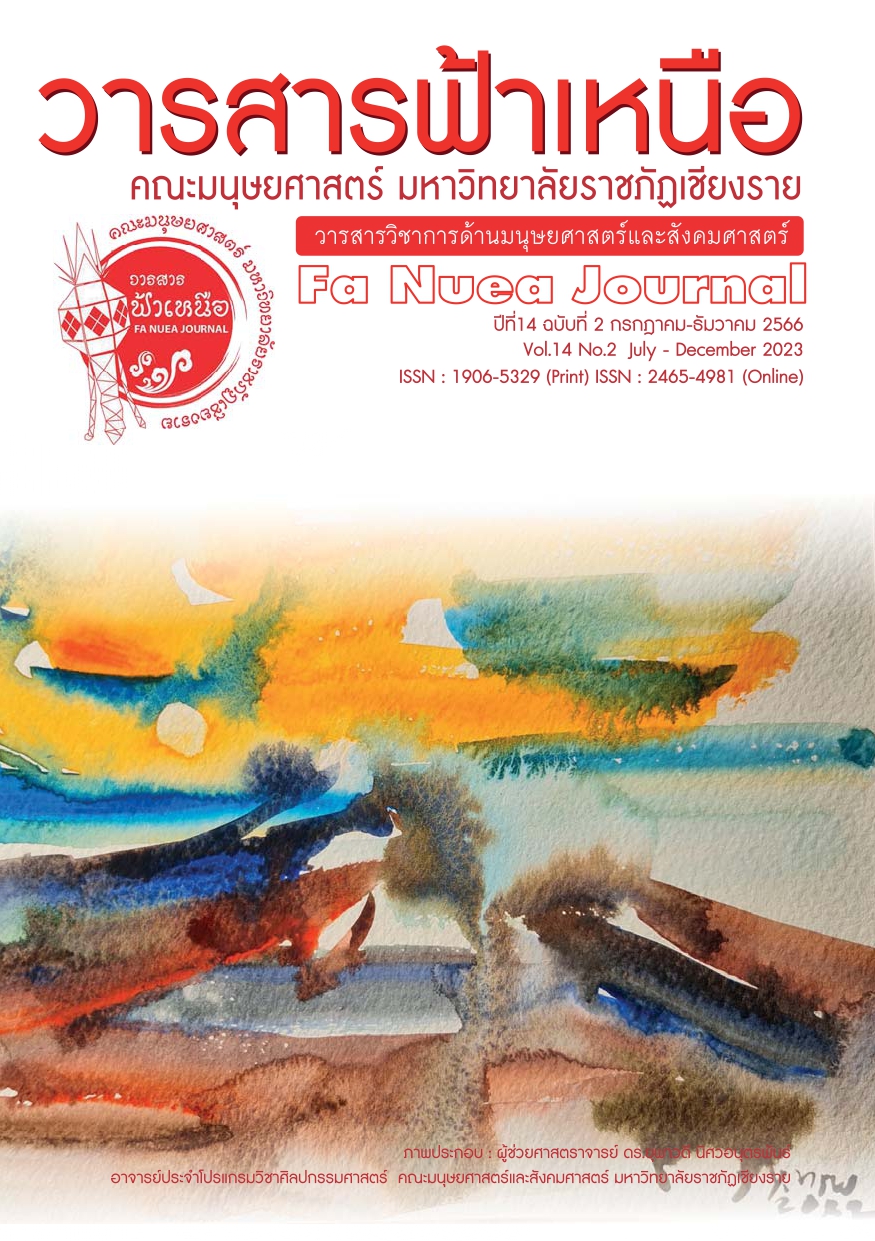Greek Mythology Story-based Instruction to Enhance English Vocabulary Learning of English Major Students
Main Article Content
Abstract
This research aimed to study the effectiveness of Greek Mythology Story-based Instruction to enhance English Vocabulary Learning and investigate the students’ attitude towards this Instructional approach among English major students. The population consisted of 134 second-year English major students who were enrolled in ENP2402 Mythological Background in Literature during the second semester of the academic year 2021. A mixed-method design with purposive sampling (n=98) were employed, utilizing English pretest and posttest assessments along with a questionnaire as instruments. Descriptive analysis, including percentage, mean, standard deviation (S.D), t-test and tabular presentation, was used to analyze the data.
The results indicated that post-test scores were significantly higher than pre-test scores (P<0.05), demonstrating the effectiveness of Greek Mythology Story-based Instruction for enhancing English vocabulary learning. Moreover, the questionnaire revealed that students expressed a positive attitude towards this instructional approach, with an average agreement level at 4.06 (S.D. = 0.7). In conclusion, this study suggests that employing Greek Mythology Story-based Instruction can be beneficial in teaching and learning processes, particularly in enhancing English vocabulary learning for English major students.
Article Details

This work is licensed under a Creative Commons Attribution-NonCommercial-NoDerivatives 4.0 International License.
Articles, information, content, pictures, etc. which have been published in Fa Nuea Journal, are copyright of Fa Nuea Journal. If any person or party wishes to disseminate all or part of it or take any action must be referenced. Do not use for commercial purposes and do not modify (CC-BY-NC-ND). For further details, please access at Attribution-NonCommercial-NoDerivatives 4.0 International (CC BY-NC-ND 4.0)
References
ซิมมี่ อุปรา. (2557). ผลการใช้เทคนิคและวิธีการสอนคำศัพท์แบบหลากหลายและส่งเสริมแรง (MEVT) กรณีศึกษานักศึกษาวิชาเอกภาษาอังกฤษ มหาวิทยาลัยราชภัฏเชียงราย. รายงานวิจัย. คณะมนุษยศาสตร์ มหาวิทยาลัยราชภัฏเชียงราย.
ณภัทริน เภาพาน, ลดาวัลย์ วัฒนบุตร, สุณี ธิตานันต์, และ สกล สรเสนา. (2554). การศึกษาผลของการเรียนรู้คำศัพท์ภาษาอังกฤษโดยใช้รูปแบบการเรียนการสอนเน้นความจำ จากภาพประกอบตามแนวทฤษฏีพหุปัญญา สำหรับนักเรียนระดับประกาศนียบัตรวิชาชีพ โรงเรียนธีรภาดาเทคโนโลยี จังหวัดร้อยเอ็ด. วารสารมหาวิทยาลัยมหาสารคาม. 5(3), 57-65.
ดุสิตา ขันธพงษ์. (2560). การสอนคำศัพท์ให้เกิดประสิทธิผล Mythology of English Language Teaching Course (MELT) Defense International Training Center (DITC) [เอกสารที่ไม่ได้ตีพิมพ์]. เครือรัฐออสเตรเลีย.
พัฐนนท์ พลหาญ. (2559). กลวิธีการเรียนรู้คำศัพท์ในสภาพแวดล้อมที่แตกต่างของผู้เรียนไทยที่เรียนทางด้านธุรกิจในระดับอุดมศึกษา. วารสารวิชาการมนุษยศาสตร์และสังคมศาสตร์, 24(45), 197-219.
วรวรรณ วงศ์ศรีวิวัฒน์. (2563).กลวิธีการเรียนรู้คำศัพท์ภาษาอังกฤษของนักเรียนชั้นปีที่ 1-3 มหาวิทยาลัยวไลยอลงกรณ์ในพระบรมราชูปถัมภ์. วารสารวไลยอลงกรณ์ปริทัศน์, 10(2), 70-84.
สรชัย พิศาลบุตร. (2559). การวิจัยทางการศึกษา (พิมพ์ครั้งที่ 2). วิทยพัฒน์.
Gower, R; Phillips, D & Walters, S. (2005). Teaching Practice: A Handbook for Teacher in Training Thailand. Oxford Macmillan Education.
Gulliga Srihasarn and Tikamporn Wuttipornpong. (2020). Using Storytelling to Facilitate L2 Vocabulary Learning and Retention: A Case Study of a Secondary School in Thailand. Journal of Liberal Arts, 9(2), 283-315.
Huang, Tengmui. (1993). Teaching and Assessing Reading Comprehension. in
A Distant Education TEFL Programmer Pilot Material: Module Two (pp.33-34). SEMEO Regional Language Certer.
Robert, L. (1998). Language teaching: Teaching English across cultures. McGrawHill.
Wallace, Micheal. (1982). Teaching Reading Skills in a Foreign Language. Heinemanne Education Book, Ltd.


